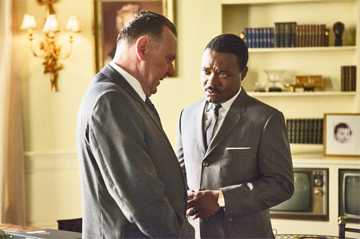
I was born in the early 50s, which means the civil rights movement unfolded during my formative years. And, like the average black kid growing up in that tumultuous era, I can recall having a visceral reaction to the nightly news coverage, since I had a personal stake in the outcome of the events.
One of my most consequential memories was when three voting rights marches were staged in Selma, Alabama in 1965. Launched by locals with the help of the Student Nonviolent Coordinating Committee (SNCC), the first demonstration came to be known as Bloody Sunday because of the way the police viciously attacked the 500 plus participants with tear gas and billy clubs at the direction of the racist sheriff Jim Clark (Stan Houston).
Fallout from the media coverage attracted the attention of Dr. Martin Luther King, Jr. (David Oyelowo) who agreed to get involved. And after an aborted second attempt to cross the Edmund Pettus Bridge, the controversy blossomed into a nationwide cause as 25,000 people, who were willing to risk their personal safety, descended upon Selma — including Harry Belafonte, Nina Simone, Joan Baez, Sammy Davis, Jr., and Peter, Paul and Mary.
The third march went off without a hitch, although participant Viola Liuzzo (Tara Ochs), a mother of five from Detroit, was murdered by four Ku Klux Klansmen just a few hours later. A couple of other martyrs also made the ultimate sacrifice in Selma; Jimmie Lee Jackson (Keith Stanfield) and Reverend James Reeb (Jeremy Strong). However, they did not die in vain because, in August, President Johnson (Tom Wilkinson) signed historic voting rights legislation into law.
All of the above has been evocatively reenacted in Selma, a civil rights story directed by Ava DuVernay (Middle of Nowhere). The picture’s release is timely in light of the resurgence of political activism all across the U.S. after grand juries did not indict the police officers responsible for the recent deaths of Michael Brown and Eric Garner.
Believe it or not, this biopic is the first full-length feature made about Dr. Martin Luther King. It is significant that the film will be released nation wide right before Dr. King’s birthday and the awards season.
The movie is an overdue tribute to a revered icon and to the unsung foot soldiers who played a critical role in the African American struggle for freedom and equality.
Excellent (****). Rated PG-13 for violence, disturbing images, and brief profanity. Running time: 127 minutes. Distributor: Paramount Pictures.

